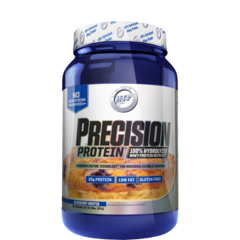
Battling Chronic Fatigue: The Unsung Hero in Hydrolyzed Whey Protein
|
|
Time to read 5 min
Chronic Fatigue Syndrome (CFS) is more than just feeling tired. It's a complex condition characterized by extreme fatigue that doesn't improve with rest and can't be explained by an underlying medical condition. If you've ever felt the relentless grip of fatigue, you know it can take a toll on every aspect of life. But there's an ally in this fight that you might not have considered: Hydrolyzed Whey Protein.
What Exactly is Hydrolyzed Whey Protein?
Hydrolyzed Whey is not your average protein. It's a form of whey protein that's been broken down into smaller pieces, making it easier for your body to absorb. This rapid absorption can be particularly beneficial for those battling with chronic fatigue. It's like giving your body the tools it needs, exactly when it needs them.
Hydrolyzed Whey's Role in Alleviating Chronic Fatigue
When you're dealing with CFS, every bit of energy counts. Hydrolyzed Whey Protein is like a quick-acting fuel for your body. It helps by:
Boosting Energy Levels:
One of the most compelling attributes of Hydrolyzed Whey is its ability to increase energy levels. Due to its hydrolyzed form, the body absorbs it more rapidly than other proteins, delivering essential amino acids almost immediately to your system. These amino acids are the building blocks for proteins that the body uses to create energy at a cellular level. They play a crucial role in the Krebs cycle, a series of chemical reactions used to release stored energy. For individuals with CFS, this efficient energy production is crucial, as their reserves are often quickly depleted.
The inclusion of Hydrolyzed Whey in your diet can thus be likened to stoking a furnace with high-quality fuel; it burns more efficiently and provides a steadier, more sustainable energy source. This can be particularly noticeable for CFS sufferers during the midday slump, where a Hydrolyzed Whey shake could mean the difference between a productive afternoon and one spent longing for the couch.
Enhancing Muscle Recovery:
Physical exertion can be daunting when you're managing CFS. Yet, on those days when you muster the strength for some form of exercise, muscle recovery is paramount. Exercise, while beneficial, creates microscopic tears in muscle fibers, which the body repairs and strengthens during recovery. This is where Hydrolyzed Whey shines. It supports the body's repair mechanisms, supplying the necessary components to rebuild muscle tissue efficiently. The faster your muscles recover, the less likely you'll experience post-exercise fatigue that can compound CFS symptoms.
Including Hydrolyzed Whey in a post-workout smoothie not only replenishes what the body has expended but also may shorten the duration of muscle soreness, helping you to maintain a more consistent exercise routine, which is often recommended for CFS management.
Supporting the Immune System:
With CFS, the immune system can become your Achilles' heel. Hydrolyzed Whey contains components like immunoglobulins and lactoferrin, which have been shown to support immune health. Immunoglobulins are antibodies that play a critical role in identifying and neutralizing foreign invaders like bacteria and viruses. Lactoferrin has antibacterial, antiviral, and anti-inflammatory properties. When your immune system is not preoccupied with fighting pathogens, it can help mitigate the overbearing fatigue that comes with CFS.
Furthermore, Hydrolyzed Whey can be a source of cysteine, which is a precursor to the antioxidant glutathione. This powerful antioxidant is crucial for reducing oxidative stress, which has been noted as a contributing factor in CFS. By potentially lowering oxidative stress, the immune system can function more effectively, focusing on energy conservation and management instead of constant defense.
By integrating Hydrolyzed Whey Protein into a CFS management plan, you're not just addressing symptoms; you're providing your body with the resources it needs to repair and thrive. This nutritional approach is one that can be tailored to meet individual needs and tolerances, and it's essential to work with a healthcare provider to determine the best strategy for your specific situation.
The role of Hydrolyzed Whey in combating chronic fatigue is multifaceted. It's a source of quick energy, a tool for muscle recovery, and a supporter of the immune system, making it a valuable component of any CFS management strategy. Whether you're looking to manage your energy levels, recover from physical activity, or support your overall immune health, Hydrolyzed Whey might be the key to unlocking a more vibrant, energetic version of yourself despite the challenges of CFS.
Personal Touch: A Recovery Tale
I remember the days when getting out of bed felt like running a marathon. My journey with CFS was overwhelming until I integrated Hydrolyzed Whey into my daily routine. It wasn't a magical overnight cure, but over time, the days became easier. I'm sharing this because if you're reading this, searching for a glimmer of hope against the battle of fatigue, I've been there.
Selecting the Right Hydrolyzed Whey Product
Not all whey proteins are created equal. Here's how to choose the best Hydrolyzed Whey:
Look for "hydrolyzed" on the label: This indicates the protein is pre-digested and ready for rapid absorption.
Check for third-party testing: This ensures the product meets quality standards.
Review the amino acid profile: Make sure it contains all essential amino acids, particularly leucine, which is critical for muscle recovery.
How to Incorporate Hydrolyzed Whey Into Your Diet
You don't have to be a gourmet chef to add Hydrolyzed Whey to your diet. Mix it into your morning smoothie, oatmeal, or even just a glass of water. The key is consistency; daily intake can help maintain steady energy levels.
Tips for Consumption
Morning Intake: Start your day with Hydrolyzed Whey to help fuel your body right off the bat.
Post-Activity Recovery: After any physical activity, consuming Hydrolyzed Whey can help with muscle recovery and reduce subsequent fatigue.
Are There Any Side Effects?
While Hydrolyzed Whey is generally safe, it can cause issues for those with lactose intolerance or a dairy allergy. It's always a good idea to consult with a healthcare provider before starting any new supplement regimen.
Your Questions Answered
Is Hydrolyzed Whey Protein Safe for Long-Term Use?
Yes, for most individuals, it is safe for long-term use when consumed as part of a balanced diet.
Can Hydrolyzed Whey Protein Replace Meals?
It's a supplement and not a meal replacement. It should be used in conjunction with a well-rounded diet.
Where to Buy Quality Hydrolyzed Whey
When it comes to purchasing Hydrolyzed Whey, look for reputable suppliers. Online health food stores, local health food shops, and even some gyms carry high-quality options.
In Conclusion: Your Next Step in Fighting Fatigue
Hydrolyzed Whey Protein could be your ally in the battle against Chronic Fatigue. It's about making that proactive step towards a more energetic you. Remember, every journey begins with a single step, and sometimes, the smallest changes make the biggest difference.
Take Action Now
If you're ready to take on Chronic Fatigue with the support of Hydrolyzed Whey, I encourage you to select a high-quality product and start noticing the changes in how you feel.
Share Your Story
Have you tried Hydrolyzed Whey Protein in your fight against Chronic Fatigue? Share your experiences in the comments below. Your story could be the beacon of hope for someone on the fence about giving it a try.
Let's conquer




